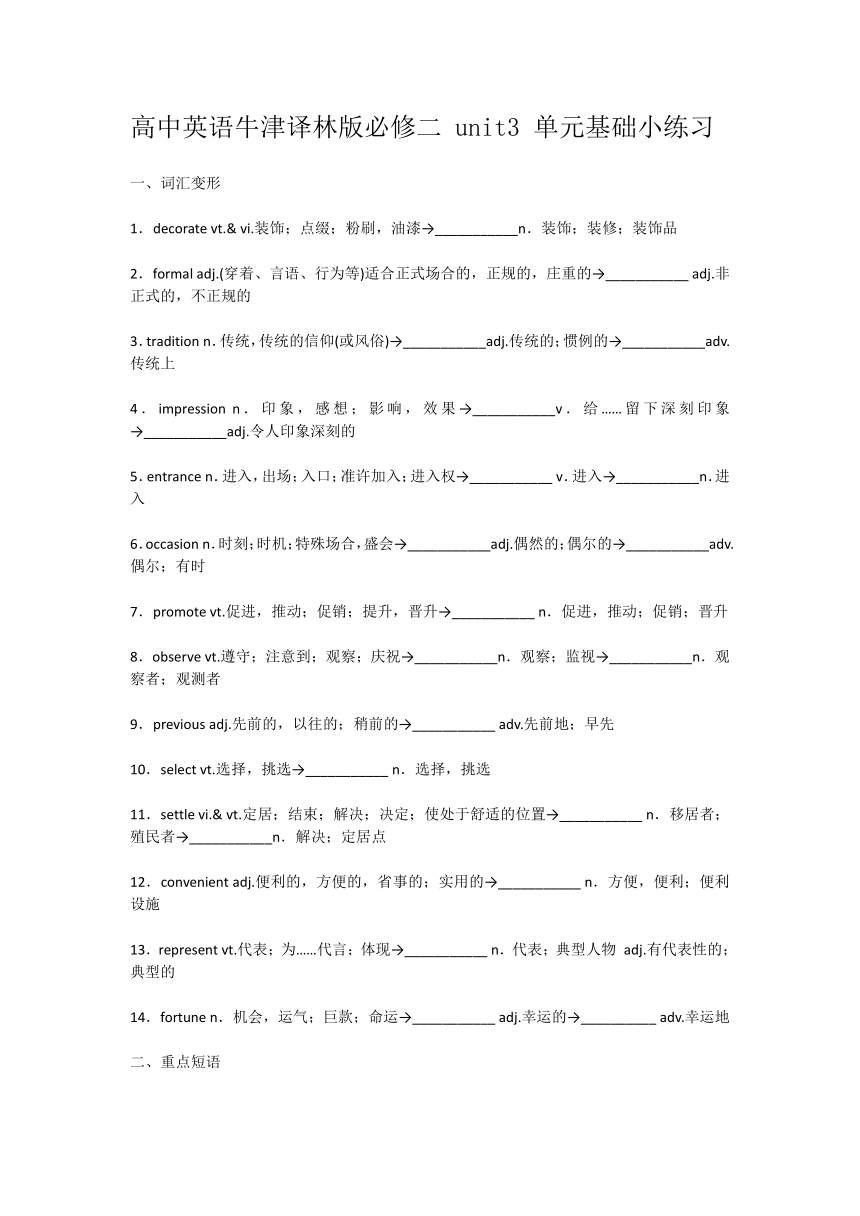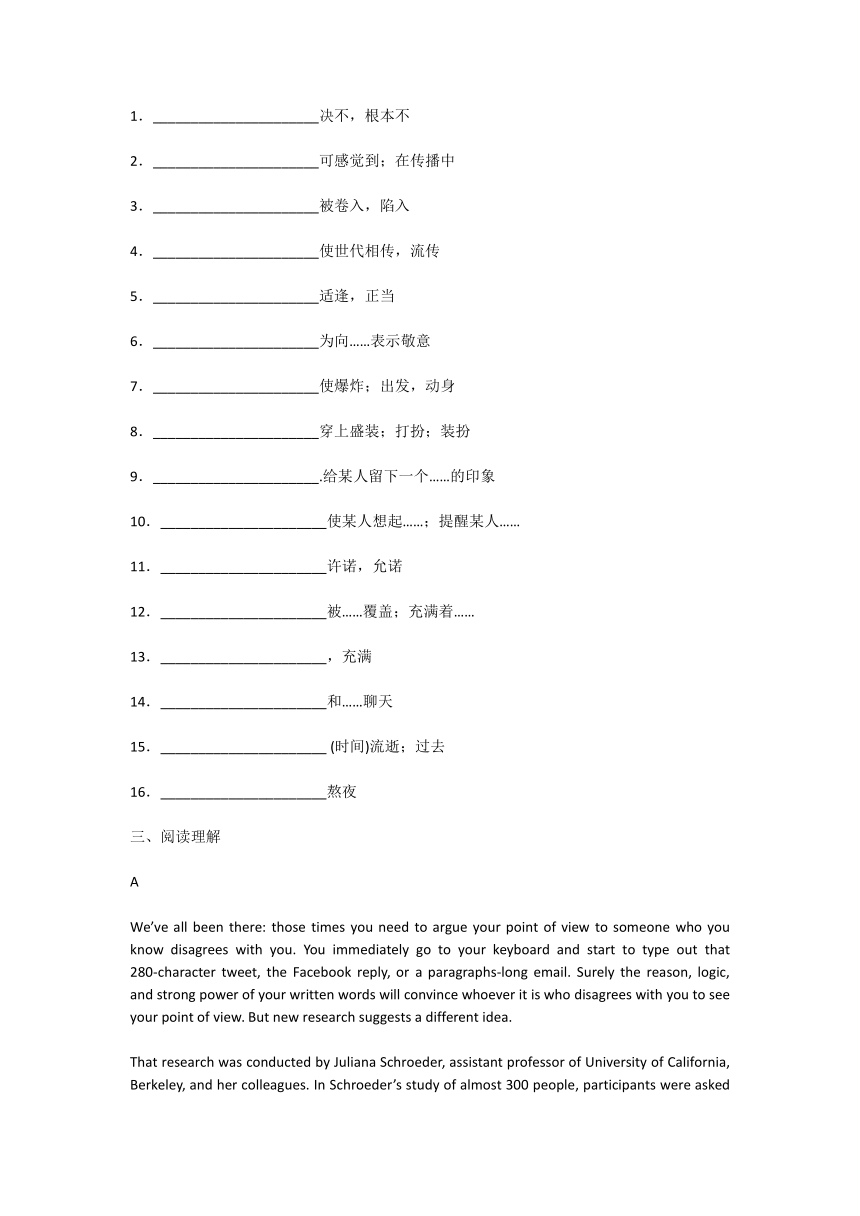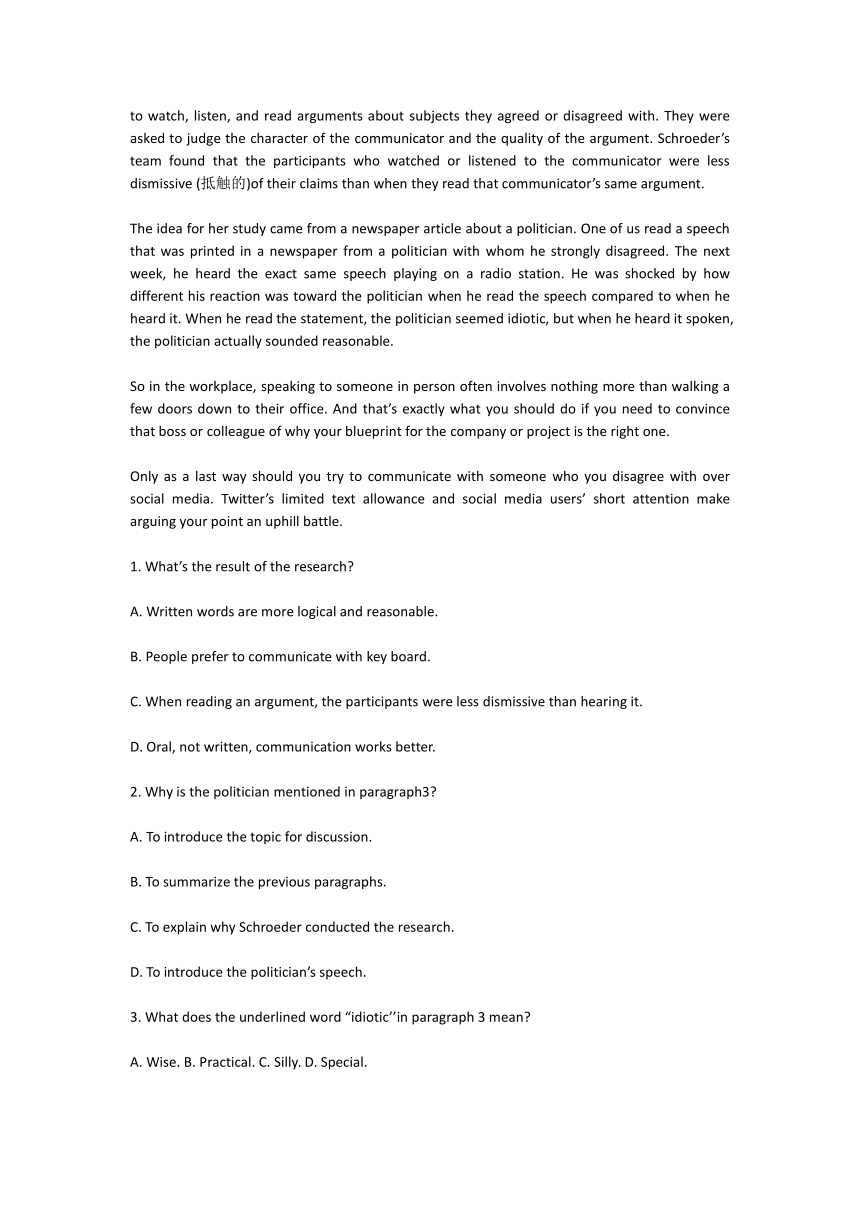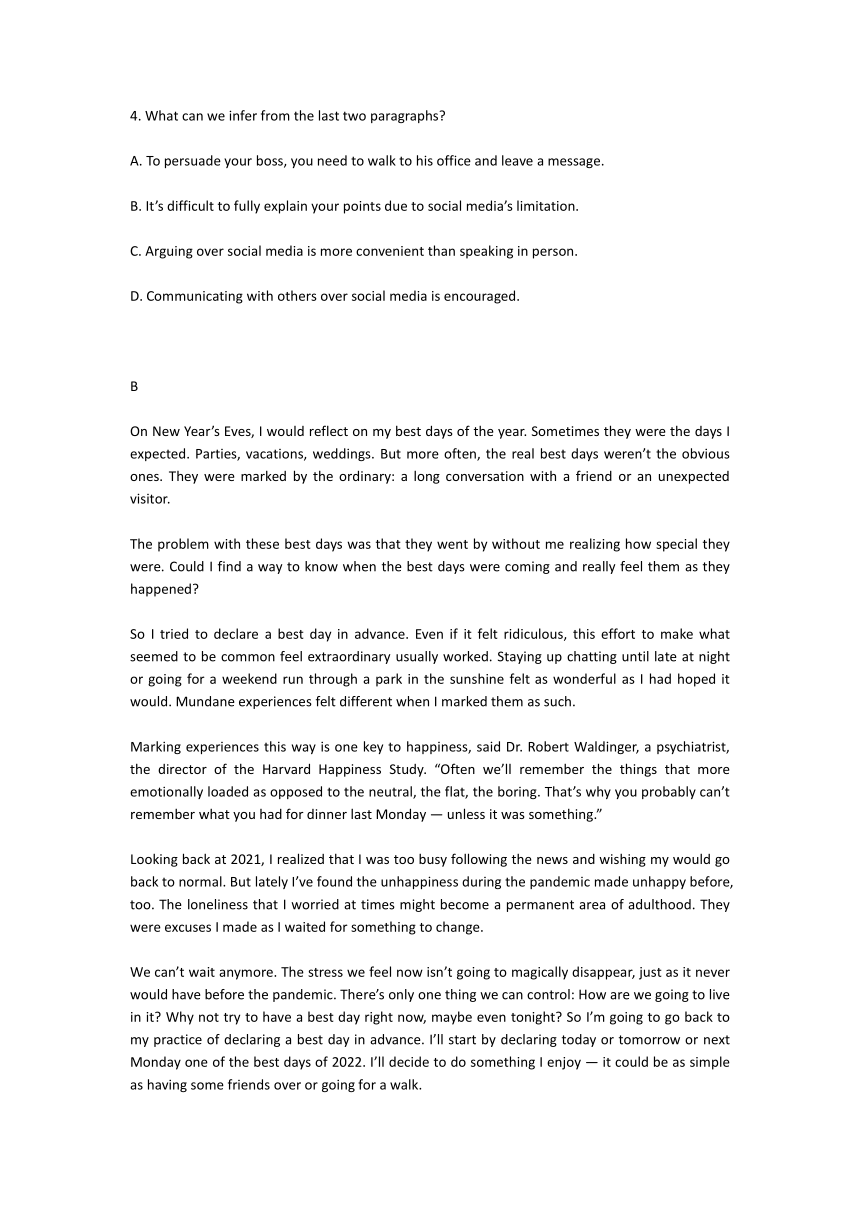牛津译林版(2019)必修二 unit3 Festivals and customs单元基础小练习(有答案)
文档属性
| 名称 | 牛津译林版(2019)必修二 unit3 Festivals and customs单元基础小练习(有答案) |

|
|
| 格式 | zip | ||
| 文件大小 | 15.5KB | ||
| 资源类型 | 教案 | ||
| 版本资源 | 牛津译林版(2019) | ||
| 科目 | 英语 | ||
| 更新时间 | 2022-10-07 00:00:00 | ||
图片预览




文档简介
高中英语牛津译林版必修二 unit3 单元基础小练习
一、词汇变形
1.decorate vt.& vi.装饰;点缀;粉刷,油漆→___________n.装饰;装修;装饰品
2.formal adj.(穿着、言语、行为等)适合正式场合的,正规的,庄重的→___________ adj.非正式的,不正规的
3.tradition n.传统,传统的信仰(或风俗)→___________adj.传统的;惯例的→___________adv.传统上
4.impression n.印象,感想;影响,效果→___________v.给……留下深刻印象→___________adj.令人印象深刻的
5.entrance n.进入,出场;入口;准许加入;进入权→___________ v.进入→___________n.进入
6.occasion n.时刻;时机;特殊场合,盛会→___________adj.偶然的;偶尔的→___________adv.偶尔;有时
7.promote vt.促进,推动;促销;提升,晋升→___________ n.促进,推动;促销;晋升
8.observe vt.遵守;注意到;观察;庆祝→___________n.观察;监视→___________n.观察者;观测者
9.previous adj.先前的,以往的;稍前的→___________ adv.先前地;早先
10.select vt.选择,挑选→___________ n.选择,挑选
11.settle vi.& vt.定居;结束;解决;决定;使处于舒适的位置→___________ n.移居者;殖民者→___________n.解决;定居点
12.convenient adj.便利的,方便的,省事的;实用的→___________ n.方便,便利;便利设施
13.represent vt.代表;为……代言;体现→___________ n.代表;典型人物 adj.有代表性的;典型的
14.fortune n.机会,运气;巨款;命运→___________ adj.幸运的→__________ adv.幸运地
二、重点短语
1.______________________决不,根本不
2.______________________可感觉到;在传播中
3.______________________被卷入,陷入
4.______________________使世代相传,流传
5.______________________适逢,正当
6.______________________为向……表示敬意
7.______________________使爆炸;出发,动身
8.______________________穿上盛装;打扮;装扮
9.______________________.给某人留下一个……的印象
10.______________________使某人想起……;提醒某人……
11.______________________许诺,允诺
12.______________________被……覆盖;充满着……
13.______________________,充满
14.______________________和……聊天
15.______________________ (时间)流逝;过去
16.______________________熬夜
三、阅读理解
A
We’ve all been there: those times you need to argue your point of view to someone who you know disagrees with you. You immediately go to your keyboard and start to type out that 280-character tweet, the Facebook reply, or a paragraphs-long email. Surely the reason, logic, and strong power of your written words will convince whoever it is who disagrees with you to see your point of view. But new research suggests a different idea.
That research was conducted by Juliana Schroeder, assistant professor of University of California, Berkeley, and her colleagues. In Schroeder’s study of almost 300 people, participants were asked to watch, listen, and read arguments about subjects they agreed or disagreed with. They were asked to judge the character of the communicator and the quality of the argument. Schroeder’s team found that the participants who watched or listened to the communicator were less dismissive (抵触的)of their claims than when they read that communicator’s same argument.
The idea for her study came from a newspaper article about a politician. One of us read a speech that was printed in a newspaper from a politician with whom he strongly disagreed. The next week, he heard the exact same speech playing on a radio station. He was shocked by how different his reaction was toward the politician when he read the speech compared to when he heard it. When he read the statement, the politician seemed idiotic, but when he heard it spoken, the politician actually sounded reasonable.
So in the workplace, speaking to someone in person often involves nothing more than walking a few doors down to their office. And that’s exactly what you should do if you need to convince that boss or colleague of why your blueprint for the company or project is the right one.
Only as a last way should you try to communicate with someone who you disagree with over social media. Twitter’s limited text allowance and social media users’ short attention make arguing your point an uphill battle.
1. What’s the result of the research
A. Written words are more logical and reasonable.
B. People prefer to communicate with key board.
C. When reading an argument, the participants were less dismissive than hearing it.
D. Oral, not written, communication works better.
2. Why is the politician mentioned in paragraph3
A. To introduce the topic for discussion.
B. To summarize the previous paragraphs.
C. To explain why Schroeder conducted the research.
D. To introduce the politician’s speech.
3. What does the underlined word “idiotic’’in paragraph 3 mean
A. Wise. B. Practical. C. Silly. D. Special.
4. What can we infer from the last two paragraphs
A. To persuade your boss, you need to walk to his office and leave a message.
B. It’s difficult to fully explain your points due to social media’s limitation.
C. Arguing over social media is more convenient than speaking in person.
D. Communicating with others over social media is encouraged.
B
On New Year’s Eves, I would reflect on my best days of the year. Sometimes they were the days I expected. Parties, vacations, weddings. But more often, the real best days weren’t the obvious ones. They were marked by the ordinary: a long conversation with a friend or an unexpected visitor.
The problem with these best days was that they went by without me realizing how special they were. Could I find a way to know when the best days were coming and really feel them as they happened
So I tried to declare a best day in advance. Even if it felt ridiculous, this effort to make what seemed to be common feel extraordinary usually worked. Staying up chatting until late at night or going for a weekend run through a park in the sunshine felt as wonderful as I had hoped it would. Mundane experiences felt different when I marked them as such.
Marking experiences this way is one key to happiness, said Dr. Robert Waldinger, a psychiatrist, the director of the Harvard Happiness Study. “Often we’ll remember the things that more emotionally loaded as opposed to the neutral, the flat, the boring. That’s why you probably can’t remember what you had for dinner last Monday — unless it was something.”
Looking back at 2021, I realized that I was too busy following the news and wishing my would go back to normal. But lately I’ve found the unhappiness during the pandemic made unhappy before, too. The loneliness that I worried at times might become a permanent area of adulthood. They were excuses I made as I waited for something to change.
We can’t wait anymore. The stress we feel now isn’t going to magically disappear, just as it never would have before the pandemic. There’s only one thing we can control: How are we going to live in it Why not try to have a best day right now, maybe even tonight So I’m going to go back to my practice of declaring a best day in advance. I’ll start by declaring today or tomorrow or next Monday one of the best days of 2022. I’ll decide to do something I enjoy — it could be as simple as having some friends over or going for a walk.
1. What does the underlined word “Mundane” in paragraph 3 probably mean
A. specific B. ordinary C. occasional D. special
2. Why does the author mention the words from Dr. Robert Waldinger
A. To prove what the author tried to do was right.
B. To spread the knowledge about the happiness study.
C. To prove we can’t remember the boring and flat information.
D. To convince readers of the importance of the happiness study.
3. According to the passage, what attitude should the author have towards negative emotions during the pandemic
A. Believe these emotions will disappear in the future.
B. Realize these emotions are special in this period.
C. Believe these emotions will not influence his life.
D. Realize these emotions exist in other periods too.
4. Which of the following can be the best title for this passage
A. You Can Wait For the Best Day.
B. You Can Make Any Day the Best Day.
C. You Can Own the Emotionally Best Day.
D. You Can Recall the Best Day.
三、写作:
你校正在组织英语作文比赛。请以身边值得尊敬和爱戴的人为题,写一篇短文参赛,内容包括:
1. 人物简介;
2. 尊敬和爱戴的原因。
注意:
1. 词数100左右;
2. 短文题目和首句已为你写好。
____________________________________________________________________________________________________________________________________________________________________________________________________________________________________________________________________________________________________________________________________________________________________________________________________________________________________________________________________________________________________________________________________________________________________________________________________________________________________________________________________
答案:
一、词汇变形
1.decorate vt.& vi.装饰;点缀;粉刷,油漆→decoration n.装饰;装修;装饰品
2.formal adj.(穿着、言语、行为等)适合正式场合的,正规的,庄重的→informal adj.非正式的,不正规的
3.tradition n.传统,传统的信仰(或风俗)→traditional adj.传统的;惯例的→traditionally adv.传统上
4.impression n.印象,感想;影响,效果→impress v.给……留下深刻印象→impressive adj.令人印象深刻的
5.entrance n.进入,出场;入口;准许加入;进入权→enter v.进入→entry n.进入
6.occasion n.时刻;时机;特殊场合,盛会→occasional adj.偶然的;偶尔的→occasionally adv.偶尔;有时
7.promote vt.促进,推动;促销;提升,晋升→promotion n.促进,推动;促销;晋升
8.observe vt.遵守;注意到;观察;庆祝→observation n.观察;监视→observer n.观察者;观测者
9.previous adj.先前的,以往的;稍前的→previously adv.先前地;早先
10.select vt.选择,挑选→selection n.选择,挑选
11.settle vi.& vt.定居;结束;解决;决定;使处于舒适的位置→settler n.移居者;殖民者→settlement n.解决;定居点
12.convenient adj.便利的,方便的,省事的;实用的→convenience n.方便,便利;便利设施
13.represent vt.代表;为……代言;体现→representative n.代表;典型人物 adj.有代表性的;典型的
14.fortune n.机会,运气;巨款;命运→fortunate adj.幸运的→fortunately adv.幸运地
二、重点短语
1.anything but决不,根本不
2.in the air可感觉到;在传播中
3.be caught up in被卷入,陷入
4.pass down使世代相传,流传
5.fall on适逢,正当
6.in honour of为向……表示敬意
7.set off使爆炸;出发,动身
8.dress up穿上盛装;打扮;装扮
9.make/leave a(n)...impression on/upon sb.给某人留下一个……的印象
10.remind sb.of...使某人想起……;提醒某人……
11.make a promise许诺,允诺
12.be covered with被……覆盖;充满着……
13.fill...with...装满,充满
14.chat with和……聊天
15.go by (时间)流逝;过去
16.stay up late熬夜
阅读
A篇:【答案】1. D 2. A 3. C 4. D
B篇:【答案】1. B 2. A 3. D 4 B
写作
The person I respect
We have a lot of respectable people around us. They may be our teachers, parents or one of our elders. As for me, my father is the person I respect most. My father is a teacher who loves his work and his students very much. He works very hard every day but he will also spare some time to accompany me and share many funny things with me about his work.
When I come across the problems of learning in my study, my father will listen to me patiently and encourage me to overcome the difficulties bravely. He achieved a lot in his work, respected by his students. So, in my mind my father is the person I respect most and I love him deeply.
一、词汇变形
1.decorate vt.& vi.装饰;点缀;粉刷,油漆→___________n.装饰;装修;装饰品
2.formal adj.(穿着、言语、行为等)适合正式场合的,正规的,庄重的→___________ adj.非正式的,不正规的
3.tradition n.传统,传统的信仰(或风俗)→___________adj.传统的;惯例的→___________adv.传统上
4.impression n.印象,感想;影响,效果→___________v.给……留下深刻印象→___________adj.令人印象深刻的
5.entrance n.进入,出场;入口;准许加入;进入权→___________ v.进入→___________n.进入
6.occasion n.时刻;时机;特殊场合,盛会→___________adj.偶然的;偶尔的→___________adv.偶尔;有时
7.promote vt.促进,推动;促销;提升,晋升→___________ n.促进,推动;促销;晋升
8.observe vt.遵守;注意到;观察;庆祝→___________n.观察;监视→___________n.观察者;观测者
9.previous adj.先前的,以往的;稍前的→___________ adv.先前地;早先
10.select vt.选择,挑选→___________ n.选择,挑选
11.settle vi.& vt.定居;结束;解决;决定;使处于舒适的位置→___________ n.移居者;殖民者→___________n.解决;定居点
12.convenient adj.便利的,方便的,省事的;实用的→___________ n.方便,便利;便利设施
13.represent vt.代表;为……代言;体现→___________ n.代表;典型人物 adj.有代表性的;典型的
14.fortune n.机会,运气;巨款;命运→___________ adj.幸运的→__________ adv.幸运地
二、重点短语
1.______________________决不,根本不
2.______________________可感觉到;在传播中
3.______________________被卷入,陷入
4.______________________使世代相传,流传
5.______________________适逢,正当
6.______________________为向……表示敬意
7.______________________使爆炸;出发,动身
8.______________________穿上盛装;打扮;装扮
9.______________________.给某人留下一个……的印象
10.______________________使某人想起……;提醒某人……
11.______________________许诺,允诺
12.______________________被……覆盖;充满着……
13.______________________,充满
14.______________________和……聊天
15.______________________ (时间)流逝;过去
16.______________________熬夜
三、阅读理解
A
We’ve all been there: those times you need to argue your point of view to someone who you know disagrees with you. You immediately go to your keyboard and start to type out that 280-character tweet, the Facebook reply, or a paragraphs-long email. Surely the reason, logic, and strong power of your written words will convince whoever it is who disagrees with you to see your point of view. But new research suggests a different idea.
That research was conducted by Juliana Schroeder, assistant professor of University of California, Berkeley, and her colleagues. In Schroeder’s study of almost 300 people, participants were asked to watch, listen, and read arguments about subjects they agreed or disagreed with. They were asked to judge the character of the communicator and the quality of the argument. Schroeder’s team found that the participants who watched or listened to the communicator were less dismissive (抵触的)of their claims than when they read that communicator’s same argument.
The idea for her study came from a newspaper article about a politician. One of us read a speech that was printed in a newspaper from a politician with whom he strongly disagreed. The next week, he heard the exact same speech playing on a radio station. He was shocked by how different his reaction was toward the politician when he read the speech compared to when he heard it. When he read the statement, the politician seemed idiotic, but when he heard it spoken, the politician actually sounded reasonable.
So in the workplace, speaking to someone in person often involves nothing more than walking a few doors down to their office. And that’s exactly what you should do if you need to convince that boss or colleague of why your blueprint for the company or project is the right one.
Only as a last way should you try to communicate with someone who you disagree with over social media. Twitter’s limited text allowance and social media users’ short attention make arguing your point an uphill battle.
1. What’s the result of the research
A. Written words are more logical and reasonable.
B. People prefer to communicate with key board.
C. When reading an argument, the participants were less dismissive than hearing it.
D. Oral, not written, communication works better.
2. Why is the politician mentioned in paragraph3
A. To introduce the topic for discussion.
B. To summarize the previous paragraphs.
C. To explain why Schroeder conducted the research.
D. To introduce the politician’s speech.
3. What does the underlined word “idiotic’’in paragraph 3 mean
A. Wise. B. Practical. C. Silly. D. Special.
4. What can we infer from the last two paragraphs
A. To persuade your boss, you need to walk to his office and leave a message.
B. It’s difficult to fully explain your points due to social media’s limitation.
C. Arguing over social media is more convenient than speaking in person.
D. Communicating with others over social media is encouraged.
B
On New Year’s Eves, I would reflect on my best days of the year. Sometimes they were the days I expected. Parties, vacations, weddings. But more often, the real best days weren’t the obvious ones. They were marked by the ordinary: a long conversation with a friend or an unexpected visitor.
The problem with these best days was that they went by without me realizing how special they were. Could I find a way to know when the best days were coming and really feel them as they happened
So I tried to declare a best day in advance. Even if it felt ridiculous, this effort to make what seemed to be common feel extraordinary usually worked. Staying up chatting until late at night or going for a weekend run through a park in the sunshine felt as wonderful as I had hoped it would. Mundane experiences felt different when I marked them as such.
Marking experiences this way is one key to happiness, said Dr. Robert Waldinger, a psychiatrist, the director of the Harvard Happiness Study. “Often we’ll remember the things that more emotionally loaded as opposed to the neutral, the flat, the boring. That’s why you probably can’t remember what you had for dinner last Monday — unless it was something.”
Looking back at 2021, I realized that I was too busy following the news and wishing my would go back to normal. But lately I’ve found the unhappiness during the pandemic made unhappy before, too. The loneliness that I worried at times might become a permanent area of adulthood. They were excuses I made as I waited for something to change.
We can’t wait anymore. The stress we feel now isn’t going to magically disappear, just as it never would have before the pandemic. There’s only one thing we can control: How are we going to live in it Why not try to have a best day right now, maybe even tonight So I’m going to go back to my practice of declaring a best day in advance. I’ll start by declaring today or tomorrow or next Monday one of the best days of 2022. I’ll decide to do something I enjoy — it could be as simple as having some friends over or going for a walk.
1. What does the underlined word “Mundane” in paragraph 3 probably mean
A. specific B. ordinary C. occasional D. special
2. Why does the author mention the words from Dr. Robert Waldinger
A. To prove what the author tried to do was right.
B. To spread the knowledge about the happiness study.
C. To prove we can’t remember the boring and flat information.
D. To convince readers of the importance of the happiness study.
3. According to the passage, what attitude should the author have towards negative emotions during the pandemic
A. Believe these emotions will disappear in the future.
B. Realize these emotions are special in this period.
C. Believe these emotions will not influence his life.
D. Realize these emotions exist in other periods too.
4. Which of the following can be the best title for this passage
A. You Can Wait For the Best Day.
B. You Can Make Any Day the Best Day.
C. You Can Own the Emotionally Best Day.
D. You Can Recall the Best Day.
三、写作:
你校正在组织英语作文比赛。请以身边值得尊敬和爱戴的人为题,写一篇短文参赛,内容包括:
1. 人物简介;
2. 尊敬和爱戴的原因。
注意:
1. 词数100左右;
2. 短文题目和首句已为你写好。
____________________________________________________________________________________________________________________________________________________________________________________________________________________________________________________________________________________________________________________________________________________________________________________________________________________________________________________________________________________________________________________________________________________________________________________________________________________________________________________________________
答案:
一、词汇变形
1.decorate vt.& vi.装饰;点缀;粉刷,油漆→decoration n.装饰;装修;装饰品
2.formal adj.(穿着、言语、行为等)适合正式场合的,正规的,庄重的→informal adj.非正式的,不正规的
3.tradition n.传统,传统的信仰(或风俗)→traditional adj.传统的;惯例的→traditionally adv.传统上
4.impression n.印象,感想;影响,效果→impress v.给……留下深刻印象→impressive adj.令人印象深刻的
5.entrance n.进入,出场;入口;准许加入;进入权→enter v.进入→entry n.进入
6.occasion n.时刻;时机;特殊场合,盛会→occasional adj.偶然的;偶尔的→occasionally adv.偶尔;有时
7.promote vt.促进,推动;促销;提升,晋升→promotion n.促进,推动;促销;晋升
8.observe vt.遵守;注意到;观察;庆祝→observation n.观察;监视→observer n.观察者;观测者
9.previous adj.先前的,以往的;稍前的→previously adv.先前地;早先
10.select vt.选择,挑选→selection n.选择,挑选
11.settle vi.& vt.定居;结束;解决;决定;使处于舒适的位置→settler n.移居者;殖民者→settlement n.解决;定居点
12.convenient adj.便利的,方便的,省事的;实用的→convenience n.方便,便利;便利设施
13.represent vt.代表;为……代言;体现→representative n.代表;典型人物 adj.有代表性的;典型的
14.fortune n.机会,运气;巨款;命运→fortunate adj.幸运的→fortunately adv.幸运地
二、重点短语
1.anything but决不,根本不
2.in the air可感觉到;在传播中
3.be caught up in被卷入,陷入
4.pass down使世代相传,流传
5.fall on适逢,正当
6.in honour of为向……表示敬意
7.set off使爆炸;出发,动身
8.dress up穿上盛装;打扮;装扮
9.make/leave a(n)...impression on/upon sb.给某人留下一个……的印象
10.remind sb.of...使某人想起……;提醒某人……
11.make a promise许诺,允诺
12.be covered with被……覆盖;充满着……
13.fill...with...装满,充满
14.chat with和……聊天
15.go by (时间)流逝;过去
16.stay up late熬夜
阅读
A篇:【答案】1. D 2. A 3. C 4. D
B篇:【答案】1. B 2. A 3. D 4 B
写作
The person I respect
We have a lot of respectable people around us. They may be our teachers, parents or one of our elders. As for me, my father is the person I respect most. My father is a teacher who loves his work and his students very much. He works very hard every day but he will also spare some time to accompany me and share many funny things with me about his work.
When I come across the problems of learning in my study, my father will listen to me patiently and encourage me to overcome the difficulties bravely. He achieved a lot in his work, respected by his students. So, in my mind my father is the person I respect most and I love him deeply.
